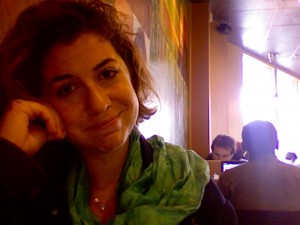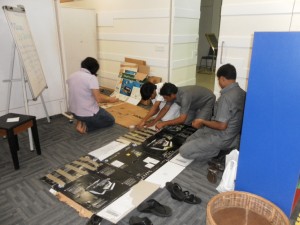 It was sunny in Los Angeles, 12 noon, and I’d just eaten a wedge of cheese. But still. I was cold. I was tired. And I was hungry.
It was sunny in Los Angeles, 12 noon, and I’d just eaten a wedge of cheese. But still. I was cold. I was tired. And I was hungry.
While the prospect of going home and taking a nap enticed me, especially after I got lost looking for Ollin Cafe, then arrived only to find that it’d been transformed into a Mexican bakery, I pushed on. I found another coffeeshop (run by a Ghanian man whose grant for a non-profit African culture youth program I offered to edit) and read about pedagogy. When Don had to close his shop early, I again stifled the impulse to close shop myself and instead relocated to Starbucks.
There, at a crusty table co-occupied by antisocial, screen-glued men, inspiration began to flow… I don’t know that this will actually BECOME my dissertation. Most likely, the final product will barely resemble this outline. Nonetheless, I think I’m onto something here. And boy, do I feel proud…
NOTE: The formatting below is improper — not indented as it should be. If you’d like to see it in its hierarchical glory, click on the hyperlink above.
————————————————–
Dissertation: Strategic curricular approaches to social change interventions
I. Introduction
A. Hook: Allegorical anecdote
B. Thesis: Social change interventions, whether explicitly educational or otherwise, should employ strategies that are versatile/adaptable and address the whole person; such strategies include: creating a culture of participatory learning, and adopting means and ends oriented towards primary skills development.
C. Overview of paper
II. Review of lit/theoretical background
A. Participation and play
1. Participation
2. Play
B. Primary skill set
1. Asset appreciation (AA)
2. Social and emotional learning (SEL)
3. New media literacies (NML)
4. Narrative
C. Domestic education interventions
1. Current challenges
i. lack of funding
ii. test scores: low and invalid
iii. health/safety challenges
iv. cultural shifts
2. Prevailing perspectives
i. it’s lazy teachers’ fault
ii. it’s non-standardized curriculum’s fault
iii. it’s marginalized students’ fault
iv. it’s lack of technology’s fault
3. Programs/solutions
i. Status quo or even regressive: NCLB
ii. Status quo or ancillary or inadequate: Charter & pilot schools
iii. Innovative: Foundation initiatives (e.g., MacArthur’s YouMedia); Independent entities (e.g., Globaloria); University partnerships (e.g., USC’s Hybrid High or Pathfinder)
D. International social change interventions
1. Current challenges
i. lack of funding
ii. volatility: things keep changing
iii. complexity: things are intertwined
iv. idiosyncrasies: things are particular to context
2. Prevailing perspectives
i. top-down
ii. bottom-up
3. Programs/solutions
i. Status quo or even regressive: Externally produced, highly structured, “add water and stir” programs
ii. Status quo or ancillary or inadequate: Programs that allow for token or modest modification by recipients
iii. Innovative: Positive deviance; Participatory/community-oriented development
III. Argument
A. Definitions
1. Participatory learning
i. culture/norms of context: describes basic community functioning, the ways that we treat one another, the rights and responsibilities that community members have in that space — to receive feedback, access roles, pursue passions, etc;
ii. activities of learner: describes the ways that the learner engages with the curriculum — avidly, with perseverance, enriching participation/performance with dialogue
iii. theoretical origins: participatory culture; digital media & learning; educational theory
2. Primary skills
i. mode/means: use a skill-oriented activity as vehicle for exploring content; for example, learn photography through social awareness and appropriation
ii. objective/ends: proficiency in these skills is a goal of the program (whether this is the sole or priority goal can vary; arguably, richer and more efficient if it is not the sole goal)
iii. theoretical origins: arts integration; positive deviance; asset-based community development; appreciative inquiry; human development/resilience
B. The Case for Participatory Learning
1. we live in a dynamic world of constant change
2. learning how to learn, and making that experience community-supported and interest/passion-driven, is infinitely valuable
C. The Case for Primary Skills
1. owning modifiable knowledge-skills-practices efficiently prepares us for diverse contexts (regardless of whether these contexts are volatile)
2. treating the whole person is most effective
3. AA, SEL, NML, Narrative = fundamental (Community, culture, work, meaning)
III. Methods
A. Summer Sandbox
1. Participants
2. Materials
3. Design
4. Procedure
B. Sunukaddu
1. Participants
2. Materials
3. Design
4. Procedure
C. Explore Locally, Excel Digitally
1. Participants
2. Materials
3. Design
4. Procedure
D. Playing Outside the Box
1. Participants
2. Materials
3. Design
4. Procedure
IV. Results
A. Participatory Learning Case Study: Summer Sandbox
1. Program description
2. Participants’ gains
B. Skills-based Case Study: Sunukaddu
1. Program description
2. Participants’ gains
C. Hybrid: Explore Locally, Excel Digitally
1. Program description
2. Participants’ gains
D. Hybrid: Playing Outside the Box (encompassing Play On Workshops)
1. Program description
2. Participants’ gains
V. Discussion
A. Gains in context
1. Program challenges
2. Comparisons to other programs
3. Small sample size
4. Critique of assessment tools
C. Context: Informal vs. formal learning environments, Educational interventions vs. other social change endeavors
D. Audience: Practicing teachers vs. preservice teachers vs. administrators vs. parents vs. students
E. Culture: Outsider consultants, preaching to the choir?
VI. Conclusion
A. Review
B. Other potential areas of research


